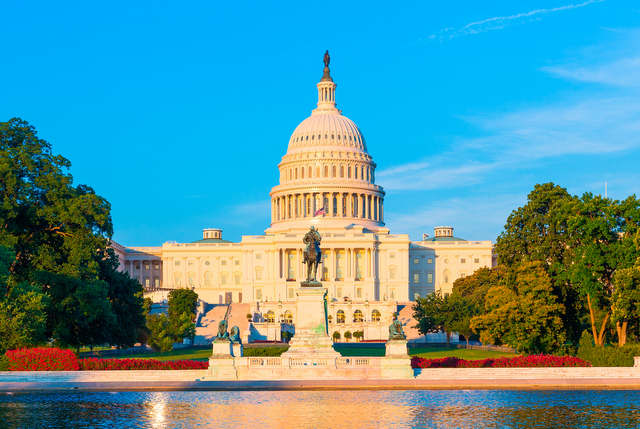Welp, they did it. House passes reconciliation bill that jeopardizes solar

Two days after the Senate passed the so-called “One Big Beautiful Bill,” the House of Representatives finalized the reconciliation budget bill that strips the solar industry of beneficial tax credits enacted by the 2022 Inflation Reduction Act.
The House passed the bill 218-214, with a vote that was almost entirely along party lines. All but two Republicans voted in favor of the mega bill, with Reps. Thomas Massie of Kentucky and Brian Fitzpatrick of Pennsylvania siding with Democrats to vote against the measure. President Donald Trump had imposed a deadline of July 4 to pass the bill that dismantles federal energy policies, which supported renewable energy development and sparked an uptick in new energy production, domestic manufacturing and job growth over the past two years.
The new bill puts hundreds of major factories announced or currently being built in jeopardy, threatening $132 billion in investments and 120,000 new jobs in 42 states, according to E2 analysis. The firm reports that businesses have already canceled or closed $15.5 billion worth of investments in new large-scale factories and projects because of the uncertainty around the tax policies.
Solar, wind and batteries, which account for more than 90% of all new power coming onto the grid, will be among the hardest-hit sectors, E2 reports. Projects will be shelved, development will stall, and the energy technologies most capable of keeping up with America’s skyrocketing demand for electricity will be sidelined. That means higher utility bills for families and businesses alike.
“This bill is a stunningly reckless blow to America’s economy and our environment,” said Bob Keefe, E2 executive director and author of the 2024 book about federal energy policy, Clean Economy NOW. “At a time of skyrocketing energy demand, Congress is dismantling the policies driving a manufacturing renaissance in America and that are critical to 90% of the new power being added to our grid.
“You don’t have to be an economist to know this will lead to higher energy prices, layoffs and project cancellations, while simultaneously making America even less competitive against China and other countries,” Keefe added.
Abigail Ross Hopper, president and CEO of the Solar Energy Industries Association (SEIA), called the bill “a significant step backwards” for the U.S. energy economy.
“In the face of rising energy costs, global instability, and growing demand for power, Congress has turned its back on the very industries that are adding the majority of the new electricity generating capacity to the grid,” Hopper said. “America is in the midst of an energy manufacturing boom, with new solar and storage factories opening across the country thanks to the forward-looking policy this law will upend. Now many of these brand new factories will be forced to shut down and lay off thousands of workers, gutting communities that were finally seeing the kind of industrial revival rural America needs and handing an untimely and strategic victory to China.”
Hopper added that the bill could have been worse, had a proposed excise tax been included in the final draft, but she called the bill “disheartening.”
“While this bill avoided some very damaging provisions, it is deeply disappointing to see partisan politics outweigh practical pro-growth solutions that serve all Americans,” Hopper said. “Solar and storage are America’s best bet to lower energy costs, build long-term energy resilience, and break free from the grip of foreign energy dependence. It is especially disheartening to witness the total disregard for the thousands of small businesses in the residential solar sector that were given only months to reinvent themselves.”
Hopper concluded with a message of resilience and hope for the solar and storage industry.
“Regardless of what happens in Washington in the coming months and years, markets will continue to drive outcomes,” she said. “The solar and storage industry is resilient, and SEIA will keep fighting every day for smart, stable, business-friendly policies that deliver on authentic and true American energy independence.”
New timelines for solar projects
The passage of the “One Big Beautiful Bill” means new deadlines to reap clean energy tax credits before they’re gone. Evan Vaughan, executive director of MAREC Action, is calling for the PJM interconnection region (and other regions around the country) to speed up their permitting and siting process in the effort to save customers from a wave of price hikes.
“Renewable energy projects in the PJM grid interconnection queue are ready to meet the Mid-Atlantic’s growing electricity demand, especially as AI and data center development rapidly accelerate electricity demand across the region,” Vaughan said. “With the new federal deadlines for clean energy tax credits, states need to make their permitting and siting processes far faster and more predictable. Otherwise, many shovel-ready projects could miss their window to qualify.”
Vaughan added the failure to expedite projects would result in higher development costs, canceled projects and higher electric bills.
“Delays at the state level dictate whether consumers can access affordable, reliable clean energy,” he said. “With so much private investment and grid reliability on the line, PJM states must act with urgency to clear a path to market.”





Comments are closed here.